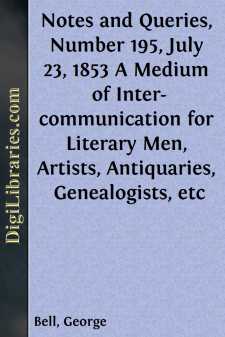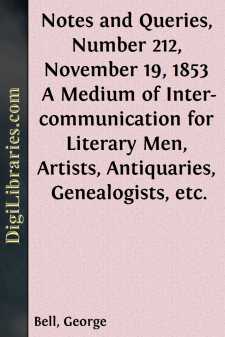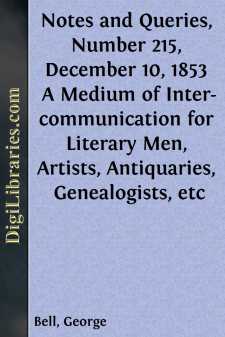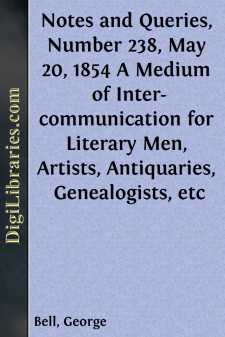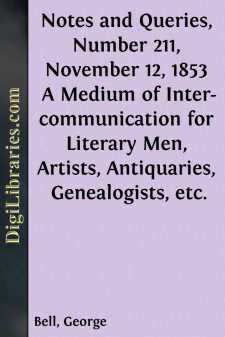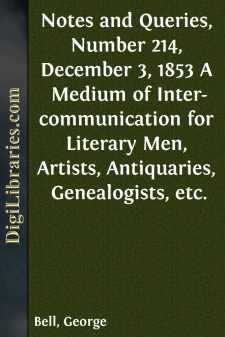Categories
- Antiques & Collectibles 13
- Architecture 36
- Art 48
- Bibles 22
- Biography & Autobiography 813
- Body, Mind & Spirit 142
- Business & Economics 28
- Children's Books 17
- Children's Fiction 14
- Computers 4
- Cooking 94
- Crafts & Hobbies 4
- Drama 346
- Education 46
- Family & Relationships 57
- Fiction 11829
- Games 19
- Gardening 17
- Health & Fitness 34
- History 1377
- House & Home 1
- Humor 147
- Juvenile Fiction 1873
- Juvenile Nonfiction 202
- Language Arts & Disciplines 88
- Law 16
- Literary Collections 686
- Literary Criticism 179
- Mathematics 13
- Medical 41
- Music 40
- Nature 179
- Non-Classifiable 1768
- Performing Arts 7
- Periodicals 1453
- Philosophy 64
- Photography 2
- Poetry 896
- Political Science 203
- Psychology 42
- Reference 154
- Religion 513
- Science 126
- Self-Help 84
- Social Science 81
- Sports & Recreation 34
- Study Aids 3
- Technology & Engineering 59
- Transportation 23
- Travel 463
- True Crime 29
Notes and Queries, Number 195, July 23, 1853 A Medium of Inter-communication for Literary Men, Artists, Antiquaries, Genealogists, etc
by: George Bell
Categories:
Description:
Excerpt
WILLIAM BLAKE.
My antiquarian tendencies bring me acquainted with many neglected and obscure individuals connected with our earlier English literature, who, after "fretting their hour" upon life's stage, have passed away; leaving their names entombed upon the title-page of some unappreciated or crotchetty book, only to be found upon the shelves of the curious.
To look for these in Kippis, Chalmers, Gorton, or Rose would be a waste of time; and although agreeing to some extent with the Utilitarians, that we have all that was worth preserving of the Antediluvians, there is, I think, here and there a name worth resuscitating, possessing claims to a niche in our "Antiquary's Newspaper;" and for that distinction, I would now put in a plea on behalf of my present subject, William Blake.
Although our author belongs to the eccentric category, he is a character not only deserving of notice, but a model for imitation: the "bee in his bonnet" having set his sympathies in the healthy direction of a large philanthropy for the spiritual and temporal interests of his fellow men.
The congenial reader has already, I doubt not, anticipated that I am about to introduce that nondescript book bearing the running title—and it never had any other—of Silver Drops, or Serious Things; purporting, in a kind of colophon, to be "written by William Blake, housekeeper to the Ladies' Charity School."
The curious in old books knows too, that, apart from its subject, theSilver Dropsof W. B. has usually an attractive exterior; most of theexemplaireswhich have come under my notice being sumptuously bound in old morocco, profusely tooled; with the name of the party to whom it had apparently been presented, stamped in a compartment upon the cover. Its value is farther enhanced by its pictorial and emblematical accompaniments. These are four in number: the first representing a heart, whereona fanciful picture of Charity supported by angels; second, a view of Highgate Charity Schools (Dorchester House); third, Time with his scythe and hour-glass; and the fourth, in three compartments, the centre containing butterflies; the smaller at top and bottom, sententious allusions to the value of time—"Time drops pearles from his golden wings," &c. These are respectable engravings, but by whom executed I know not. After these, and before coming to theSilver Drops, which are perhaps something akin to Master Brooks'Apples of Gold, the book begins abruptly: "The Ladies' Charity School-house Roll of Highgate, or a subscription of many noble well-disposed ladies for the easie carrying of it on." "Being well informed," runs the Prospectus, "that there is a pious, good, commendable work for maintaining near forty poor or fatherless children, born all at or near Highgate, Hornsey, or Hamsted: we, whose names are subscribed, do engage or promise, that if the said boys are decently cloathed in blew, lined with yellow; constantly fed all alike with good and wholsom diet; taught to read, write, and cast accompts, and so put out to trades, in order to live another day; then we will give for one year, two or three (if we well like the design, and prudent management of it,) once a year, the sum below mentioned," &c....

